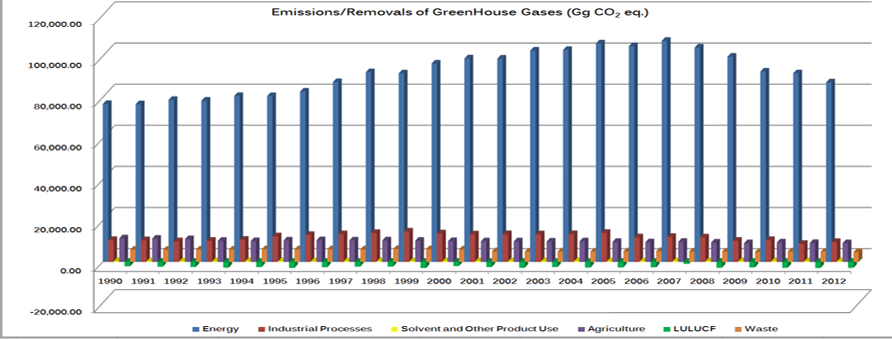According to the most recent report (AR5, 2013) of the Intergovernmental Panel on Climate Change, in the context of a global assessment of climate change science, the conclusions are clear, compelling and indisputable. With 95% certainty, the report shows that anthropogenic interference is the dominant cause of the warming effect detected since the mid-20th century. The report also confirms that the existence of global warming is undeniable.
"Climate change is a long-term challenge, but one that requires urgent action given the pace and the scale by which greenhouse gases are accumulating in the atmosphere and the risks of a more than 2 degree Celsius temperature rise. Today we need to focus on the fundamentals and on the actions, otherwise the risks we run will get higher with every year (AR5, WG1,IPCC)".
Moreover, countries with significant greenhouse gas emissions, such as the USA, recognize climate change as a growing threat:
"Climate change is an urgent and growing threat to our national security, contributing to increased natural disasters, refugee flows, and conflicts over basic resources like food and water.... Increased sea levels and storm surges threaten coastal regions, infrastructure, and property. In turn, the global economy suffers, compounding the growing costs of preparing and restoring infrastructure. (National Security Strategy, February 2015)".
The objective of the UNFCCC is to stabilize concentrations of greenhouse gases in the atmosphere at a level that would prevent dangerous anthropogenic interference with the climate system. Greece ratified the UNFCCC in 1994 with Law 2205/1994. However, the Kyoto Protocol (Law 3017/2002) essentially operationalizes the UNFCCC after developed countries committed themselves to stabilizing their emissions by setting specific, quantitative goals.
There are two areas which need attention in order to tackle climate change:
- mitigation of climate change through the reduction of greenhouse gas emissions and
- adaptation to the impacts of climate change
Greenhouse Gas Inventory Relating to Land Use, Land-Use Change and Forestry
The objective of emission reduction is achieved through UNFCCC and Kyoto Protocol commitments, and is assessed in accordance with the standards and guidelines issued by the Intergovernmental Panel on Climate Change and adopted by the Conference of the Parties to the UNFCCC and to the Kyoto Protocol with regard to greenhouse gas inventory.
Of the six sectors in a greenhouse gas inventory the most complex one is Land Use, Land Use Change and Forestry (LULUCF). ACCEL has considerable, and valuable experience in this field, in accordance with the most recently adopted international guidelines on greenhouse gas inventories for both the UNFCCC and the Kyoto Protocol.
Adaptation to Climate Change
"Adaptation refers to adjustments in ecological, social, or economic systems in response to actual or expected climatic stimuli and their effects or impacts. It refers to changes in processes, practices, and structures to moderate potential damages or to benefit from opportunities associated with climate change (IPCC, WGIITAR, 2001)".
It is without doubt that well-planned adaptation measures contribute to saving significant financial resources, as well as protecting property (public and private) and preserving human life. Some examples of adaptation measures include:
- More efficient use of small water reserves
- Adjustment of infrastructure project technical specifications for future climate conditions and extreme weather events
- Flood protection
- Development and use of drought-resistant crops
- Selection of forest species and management practices less vulnerable to storms and fires, etc.
ACCEL can provide services relating to the preparation of adaptation plans at both local, and regional level.









